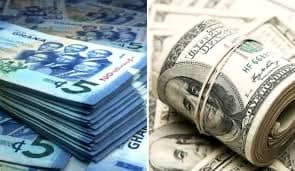by Elorm Desewu
The country’s fiat currency has come under pressure due to delay in the disbursement of the second tranche of cocoa syndicated loan as well as the third tranche of the International Monetary Fund, (IMF) Extended Credit Facility, (ECF).
Additionally, the cedi came under some pressure in recent weeks amid the stronger dollar, the usual seasonal demand pressures emanating from the energy and corporate sectors, as well as the ongoing discussions on external debt restructuring.
The Bank of Ghana, (BoG), is expecting US$200million as the second tranche of the cocoa syndicated loan as well as US$360 from the IMF to help stem the speed depreciation of the cedi which is currently trading at GHC14.25 to the American green back on the retail market.
The foreign exchange market came under some seasonal pressures in February and early March 2024. The pressures emanated mainly from the strengthening of the US dollar in international markets, and payments made for the energy and corporate sectors. These were compounded by delays and uncertainties associated with the second tranche of the cocoa loan inflow and World Bank’s disbursement of Budget Support.
According to BoG, the tight monetary policy stance and the signalled policy rates cuts in some advanced economies are expected to support the relative stability of the cedi.
Gross International Reserves at end-February 2024 was US$6.2 billion, providing cover for 2.8 months of imports of goods and services. This represents a build-up of US$292.95 million when compared with the end-December 2023 position of US$5.9 billion, equivalent to 2.7 months of import cover.




























